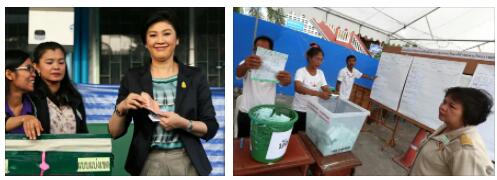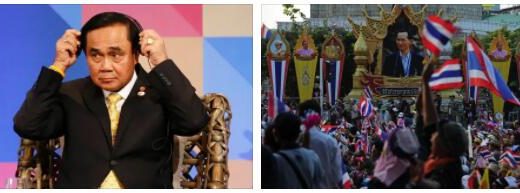Thailand Current Political Situation Part II
A general becomes prime minister
The Thai Parliament has general and coup leader Prayuth Chan-ocha with 500 of 744 votes for Prime Minister elected. The initially clear majority becomes wafer-thin if you subtract the 250 votes of the Senate installed by the military. Previously, opaque maneuvers that lasted months were preceded by the electoral commission, which postponed the distribution of seats in favor of the military-friendly parties. Gegenkandidat Thanathorn Juangroongruangkit of the New Future Party was because of sedition charged to unrest and the facilitation of escape of a dissident. Only then could the junta party Palang Pracharat form a coalition put together that gives her a wafer-thin majority in parliament. In the meantime, the electoral commission has asked the constitutional court to ban the Future Forward party, which is particularly popular among young people. Many therefore doubt that Thailand has taken serious steps towards democratization. The Future Forward party has already organized the first protests against the ban. The constitutional court has now dismissed the first indictment – which alleged, among other things, a proximity to the “Illuminati” popular with conspiracy theorists. Still, democratic rights are by no means secure. Prayuth has announced that after minor protests against him, he wants to restrict the right of assembly again.
Yingluck: Escape from Thailand
To a possible conviction for “control of money” to escape, is the former and 2014 settled by the Constitutional Court Prime Minister of Thailand, Yingluck Shinawatra, from Thailand fled. Yingluck is accused of having “embezzled” billions of euros for the rice subsidy program. The Phüa Thai party had promised a guaranteed minimum price for unpeeled rice in its election manifesto – a promise that the Yingluck government then implemented. Guaranteed minimum prices have been a requirement of small farmers in Thailand for decades. The Yingluck trial is criticized as a political maneuver. The jurisdiction can no longer be described as free and independent in Thailand since the 2006 coup. Instead, courts regularly intervene in the country’s politics – in favor of the royal network and the military. The goal this time is to politically neutralize Yingluck, who could pose a threat to the military because of her unbroken popularity. At the same time, the process is intended to prevent popular measures aimed at redistributing wealth in favor of the poorer population in the future. The court has now sentenced Yingluck to five years in prison.
The missing badge
In April 2017, the brass plaque commemorating the democratic revolution of 1932 disappeared from its location on Royal Plaza Square in Bangkok. The plaque was used by the “Peoples Party” (Khana Ratsadon) after the fall of the absolutist monarchy and the introduction of Thailand’s first democratic constitution. The inscription read: “In this place, at dawn on June 24, 1932, we, the People’s Party, brought into being the Constitution for the Progress of the Nation.” The plaque was replaced by a new one, which instead pays homage to the monarchy. Now it says “Long live Siam for all eternity! Happy citizens with fresh faces establish the country’s power. ” In the margin you can read the motto of the Chakri dynasty: “Loyalty and love for the triple jewel and for his family and an honest heart for his king are good. These are the means to allow his state to flourish. ”The replacement of the plaque fits into a policy of historical revision in which the military regime undo the 1932 revolution want. At that time there was widespread criticism of the monarchy. The revolution introduced principles such as popular sovereignty that are now being eroded by the military. Now the military junta is obviously afraid that the memory of 1932 could unite an opposition. Demonstrations that day were banned. Ekachai Hongkangwan’s attempt to complain to the police of unknown persons for the theft resulted in his arrest. There are, despite repression events held on the anniversary of the revolution, with a criticism of the monarchy and the military regime linked will. At the beginning of 2019, another monument commemorating the successful suppression of a monarchist coup attempt in 1933 was secretly removed.
Unwanted people
The Thai military junta has made following, contacting and forwarding information from three critics of the regime a criminal offense. These are the historian Somsak Jeamteerasakul, the political scientist Pavin Chachavalpongpun and the journalist Andrew MacGregor Marshall. Somsak Jeamteerasakul, known as a scholar for his analyzes of modern monarchism, has a lot of followers on social media in Thailand and abroad. He lives in exile in Paris. Pavin Chachavolpongpun, who is currently working in Kyoto, is also recognized because of his open criticism appreciated by many Thais in the monarchy. Andrew MacGegor Marshall was a former Reuters correspondent in Thailand before he started asking too critical questions. His book “A Kingdom in Crisis” is banned in Thailand. The ban can be interpreted as a sign that the military regime is worried about a widespread, critical public online. The government has censored Google and Facebook itself and threatened to close both portals completely if they do not implement Thailand’s repressive censorship policy. The ones in the Bild newspaper are also cause for concern and English tabloids published pictures of King Vajiralongkorn going shopping with his latest mistress in Munich with fake tattoos and a crop top. The military regime tries everything to prevent the dissemination of these images on the Internet. The king’s increasingly unpredictable behavior weakens the ideological foundation of the military dictatorship, which is dependent on “hyper-monarchism”. It is questionable whether more repression will prevent the critical voices from spreading online. Since the order, Andrew MacGregor Marshall’s Facebook followers have skyrocketed to 85,000.



